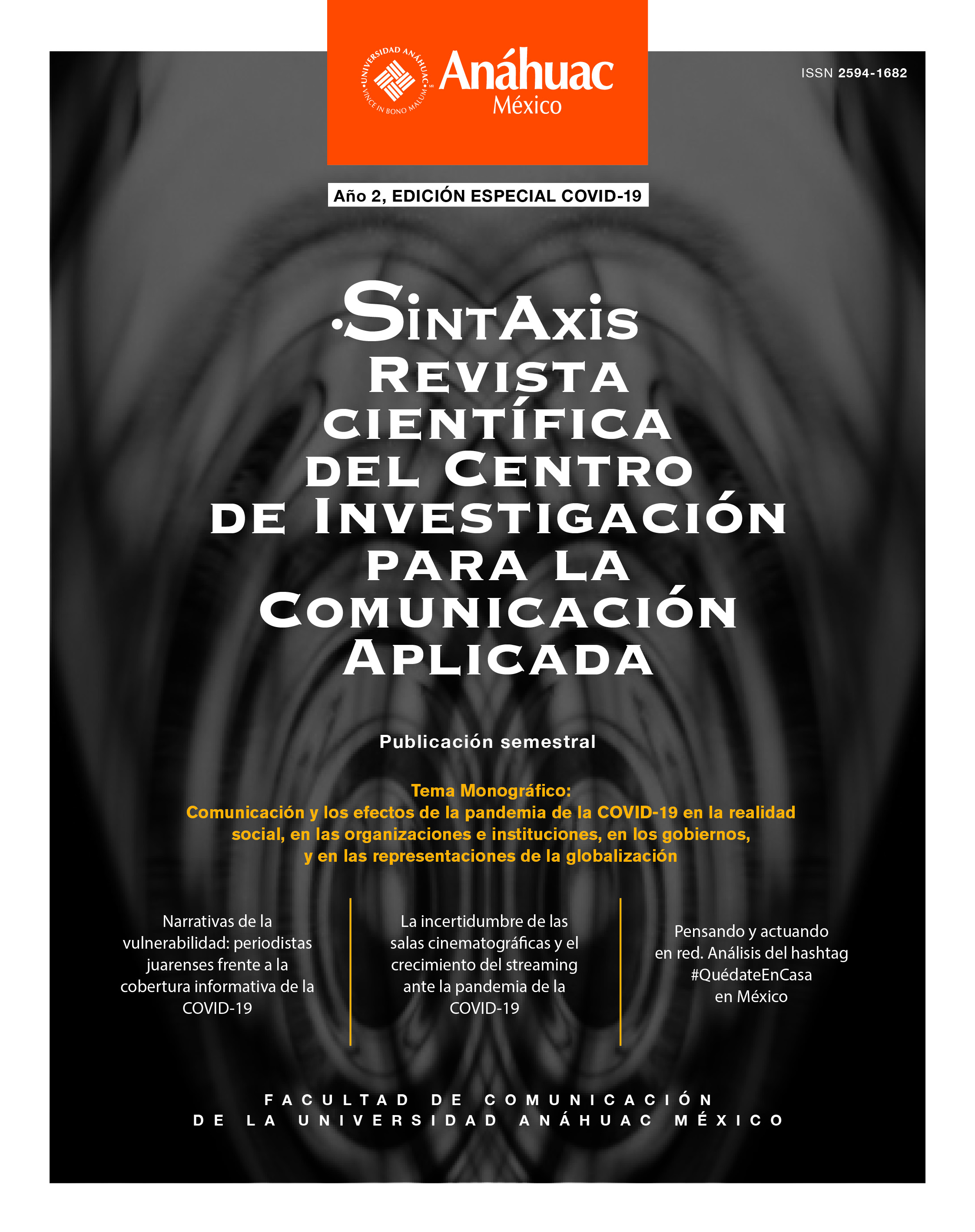Educational experiences and pandemic, a reflection since Cibercultur@
Main Article Content
Abstract
This article proposes an analysis exercise on the organization processes which have been generated in the educational aspect in regions of Latin America that are characterized by high marginalization from the experience of health emergency due to the COVID-19 pandemic, caused by the SARS-CoV-2 virus, from some contemporary approaches to communication for development such as communication for social change, cybercultur@, the social engineering of communication and the culture of participation. The article is organized in three parts, the first one presents in a general way the profile of the Latin American proposal of communication for development that begins in the seventies of the 20th century. In the second one, some characteristics of urban societies that have been configuring their information system are mentioned based on the relationship they establish with traditional and new media, and in the final part, the outline of a proposal for analysis is outlined that allowed identifying the modes of action in the educational field in unfavorable material situations.
Downloads
PLUMX Metrics
Article Details
The author keeps the property rights with no restriction whatsoever and guarantees the magazine the right to be the first publication of the work. The author is free to deposit the published version in any other medium, such as an institutional archive or on his own website.
References
Cepal. (1998). CEPAL 50 años. Naciones Unidas.
Coneval. (2020). Pobreza en México. Resultados de pobreza en México 20 18 a nivel nacional y por entidades f ederativas . https://www.coneval.org.mx/Medicion/Paginas/ PobrezaInicio.aspx
De Sousa, S. (2011). Epistemologías del Sur. Revista Utopía y Praxis Latinoamericana, 54.17-39. http://produccioncientificaluz.org/index.php/utopia/article/view/3429
Díaz, B. (1978). Comunicación y Desarrollo. En estrategias de comunicación para el desarrollorural. IICA, Ministerio de Agricultura y Cría y FUDECO.140 laura gonzález morales – guilebaldo fermín lópez lópez
Dos Santos, T. (2002). Teoría de la dependencia. Balance y perspectivas. Plaza y Janés.
Franco, F. P., & López, A. M. (2011). Una mirada a las raíces de la comunicación para el desarrollo. Entrevista con Luis Ramiro Beltrán Salmón. Revista Signo y Pensamiento, 58, 142-148. https://doi.org/10.11144/Javeriana.syp30-58.mrcp
Freire, P. (1994). La educación como práctica de la libertad. Siglo XXI.
Galindo, J. (coord). (1998). Técnicas de investigación en sociedad, cultura y comunicación. Addison Wesley Longman.
Galindo, J. (2014). Ingeniería en Comunicación Social de la Participación en la Educación. Notas para una discusión general. En García, López Edgar Josué (2014). Introducción a la Cultura de Participación. Participación, Curriculum y Educación Superior. Universidad del Centro de México-GICOM.
González, J. (2003). Entre cultura(s) y cibercultur@(s). Incursiones y otros derroteros no lineales. UIA.
González, J., Amozurrutia, J., & Maass, M. (2007). Cibercultur@ e iniciación en la investigación. Consejo Nacional para la Cultura y las Artes. CEIICH-UNA M. Instituto Mexiquense de Cultura.
Gumucio, A. D. (2004). El cuarto mosquetero: la comunicación para el cambio social. Revista de Investigación y Desarrollo, 1(12), 1-22. http://redalyc.uaemex.mx/pdf/268/26800101.pdf
Gumucio, A. D. (2011). Comunicación para el cambio social: clave del desarrollo participativo. Signo y Pensamiento, 58, 26-39. http://www.redalyc.org/pdf/860/86020038002.pdf
Han, B.C. (2015). El aroma del tiempo. Un ensayo filosófico sobre el arte de demorarse. Herder.
INEGI. (2011). Encuesta sobre la Percepción Pública de la Ciencia y la Tecnología en México. https://www.inegi.org.mx/app/biblioteca/ficha.html?upc=702825048280
Marcuello, Ch. (comp.). (2006). Sociocibernética. Lineamientos de un paradigma. Institución Fernando el Católico.
Maass, M. et al. (2012 ). Sociocibernética, cibercultur@ y sociedad. UNA M.
OCED & Banco Mundial. (2020). Panorama de la Salud: Latinoamérica y el Caribe 2020. https://doi.org/10.1787/740f9640-es
Piscitelli, A. (1995). Cibercultura en la era de las máquinas inteligentes. Paidós.
Valcárcel, M. (2006). Génesis y evolución del concepto y enfoque sobre el desarrollo. Pontificia Universidad Católica del Perú. https://www.uv.mx/mie/files/2012/10/SESION-6-Marcel-Valcarcel-Desarrollo-Sesion6.pdf
Zemelman, H. (2002). Necesidad de conciencia: un modo de construir conocimiento. Antropos.

